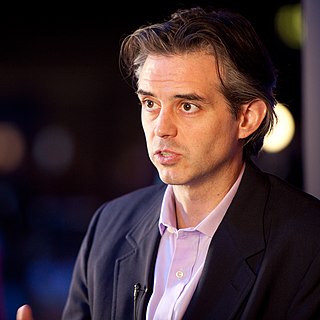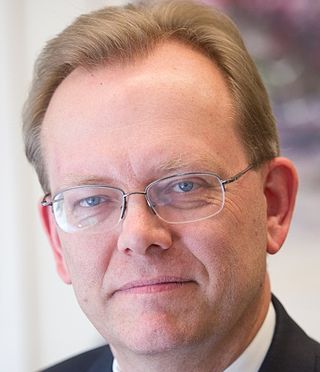The Schwab Foundation for Social Entrepreneurship is a Swiss not-for-profit organization founded in 1998 that provides platforms at the country, regional and global levels to promote social entrepreneurship. The foundation is under the legal supervision of the Swiss Federal Government. Its headquarters are in Geneva, Switzerland. Each year, it selects 20–25 social entrepreneurs through a global "Social Entrepreneur of the Year" competition.
A social enterprise is an organization that applies commercial strategies to maximize improvements in financial, social and environmental well-being. This may include maximizing social impact alongside profits for co-owners.

Social entrepreneurship is an approach by individuals, groups, start-up companies or entrepreneurs, in which they develop, fund and implement solutions to social, cultural, or environmental issues. This concept may be applied to a wide range of organizations, which vary in size, aims, and beliefs. For-profit entrepreneurs typically measure performance using business metrics like profit, revenues and increases in stock prices. Social entrepreneurs, however, are either non-profits, or they blend for-profit goals with generating a positive "return to society". Therefore, they use different metrics. Social entrepreneurship typically attempts to further broad social, cultural and environmental goals often associated with the voluntary sector in areas such as poverty alleviation, health care and community development.
Social innovations are new social practices that aim to meet social needs in a better way than the existing solutions, resulting from - for example - working conditions, education, community development or health. These ideas are created with the goal of extending and strengthening civil society. Social innovation includes the social processes of innovation, such as open source methods and techniques and also the innovations which have a social purpose—like activism, crowdfunding, time-based currency, telehealth, cohousing, virtual volunteering, microcredit, or distance learning. There are many definitions of social innovation, however, they usually include the broad criteria about social objectives, social interaction between actors or actor diversity, social outputs, and innovativeness. Different definitions include different combinations and different number of these criteria. Transformative social innovation not only introduces new approaches to seemingly intractable problems, but is successful in changing the social institutions that created the problem in the first place.

Jean Case is an American businesswoman, author, and philanthropist who is chair of the board of National Geographic, CEO of Case Impact Network, and CEO of the Case Foundation. She is married to AOL co-founder Steve Case.
Entrepreneurship is the creation or extraction of economic value in ways that generally entail beyond the minimal amount of risk, and potentially involving values besides simply economic ones.

Carl J Schramm is an American economist, entrepreneur, author, former President of the Ewing Marion Kauffman Foundation, and University Professor at Syracuse University. He is the author of the book Burn the Business Plan: What Great Entrepreneurs Really Do, published by Simon & Schuster. The Economist named Schramm the "evangelist of entrepreneurship".
The Office of Social Innovation and Civic Participation was an office new to the Obama Administration, created within the White House, to catalyze new and innovative ways of encouraging government to do business differently. Its first director was the economist Sonal Shah. The final director was David Wilkinson.
The phrase women in business refers to women who hold positions, particularly leadership in the fields of commerce, business, and entrepreneurship. It advocates for their increased participation in business.

Doug Guthrie is an American academic administrator, sociologist, and China scholar. He is currently professor of global leadership and director of China initiatives at the Thunderbird School of Global Management at The Arizona State University. He was previously the dean of The George Washington University School of Business, and professor of management and sociology and director of executive education and NYU's Stern School of Business. He has also served as a visiting professor of management at the business schools of Columbia, Stanford, Harvard, Emory, and INSEAD and as director of the Business Institutions Initiative at the Social Science Research Council.

Jane Marie Chen is the co-founder of Embrace, a social enterprise startup that produces a low-cost infant warmer, that gives premature and low-birth-weight infants a better chance at survival.

Bruce Kingma is an American economist and academic entrepreneur, who since 1988 has taught and worked in the United States, Canada, and New Zealand. Kingma is a pioneer in experiential entrepreneurship education and community engagement and his work cover topics ranging from academic entrepreneurship, entrepreneurship and religion, information economics, online education, community engagement, library science, and nonprofit management.
Patricia H. Thornton is an American organizational theorist, and Grand Challenge Initiative Professor of Sociology and Entrepreneurship at Texas A&M University as well as Adjunct Associate Professor of Business Administration at the Fuqua School of Business at Duke University. She is known for her work on "the sociology of entrepreneurship" and "the Institutional Logics Perspective."

Ndidi Okonkwo Nwuneli is a Nigerian entrepreneur, an expert on African agriculture and nutrition, philanthropy, and social innovation. She has over 25 years of international development experience and is a recognized serial entrepreneur, author, public speaker, and consultant. Through her work in the private, public, and non-profit sectors, she has led the design and execution of high-impact initiatives focused on policy, strategy, organizational design, ecosystem solutions, and growth.

Toyosi Akerele-Ogunsiji is a Nigerian social entrepreneur and human development expert whose work cuts across entrepreneurship, education, youth development and public leadership. She is the founder and chief executive officer of Rise Networks, a Nigeria-based private and public sector funded Youth Interest social enterprise.
INJAZ Al-Arab is a non-profit organization for education and training in workforce readiness, financial literacy and entrepreneurship across the Arab World. INJAZ Al-Arab is the Regional Operating Center of JA Worldwide (JAW), one of the largest global non-governmental organizations dedicated to addressing fundamental social and economic challenges faced by young people. INJAZ Al-Arab is also an active participant in the United Nations Global Compact. Over 5 million students have participated in a broad base of entrepreneurship training opportunities aimed at developing basic business skills to start and run their own businesses while obtaining soft skills increasingly demanded by the private sector. Since its inception, INJAZ Al-Arab has built a network of over 100,000 classroom volunteers, who are leaders from the corporate world. INJAZ Al-Arab has a Regional Board of Directors, which comprises 24 executives that manage some companies and institutions, as well as a team of staff, led by Akef Aqrabawi, President and CEO of the Middle East/North Africa for JA Worldwide.
Sally R. Osberg an American business executive who formerly served as president and CEO of the Skoll Foundation, where she partnered with founder and chairman, Jeffrey Skoll. She was the founding executive director of the Children's Discovery Museum of San Jose.

Njideka Françoise Harry is a World Economic Forum Schwab Foundation for Social Entrepreneurship Fellow.

Andrew Leon Hanna is an American lawyer, entrepreneur, author, and international human rights advocate. The son of immigrants from Egypt, Hanna was awarded the 2018 Financial Times and McKinsey Bracken Bower Prize for 25 Million Sparks: The Untold Story of Refugee Entrepreneurs. The book, published by Cambridge University Press, tells the stories of three Syrian women entrepreneurs in the Za'atari refugee camp and of refugee entrepreneurs around the world.
Martin Burt is a Paraguayan social entrepreneur, author, former mayor of Asunción and former chief of staff to Paraguay's president, known for founding Fundación Paraguaya in 1985, a leading non-profit and micro-finance organization in Paraguay, and creator of the Poverty Stoplight, a poverty measurement tool and coaching methodology.










